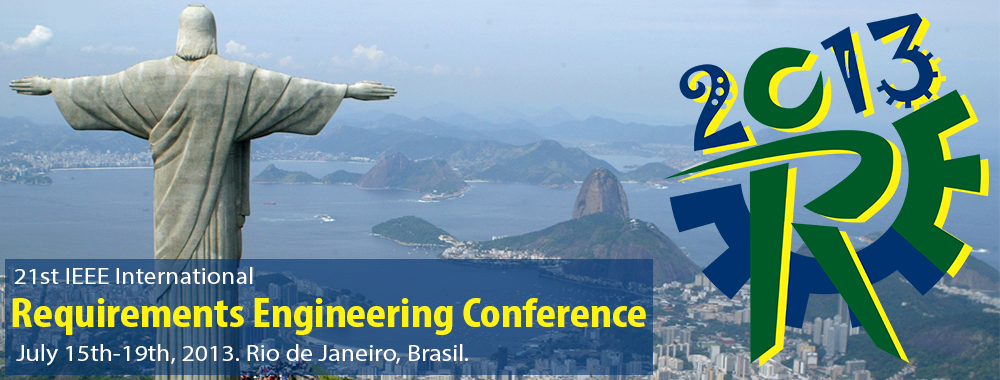News
- RE’13 presentation slides now available from the Downloads page.
Key Dates in 2013
- July 15: Doctoral Symposium
- July 15-16: Workshops & Tutorials
- July 17-19: Main Conference
Call for Research Papers
Requirements engineering (RE) encompasses all the interdisciplinary activities involved in determining, documenting, and maintaining an agreed set of requirements for a system, and for tracing these through to implementation. A specific concern is the development of practical techniques, methods, and tools to support these activities. The 21st IEEE International Requirements Engineering Conference (RE’13) invites Research Paper submissions that address any facet of the requirements engineering process, from elicitation to validation, from formal to informal, from large to small, from traditional to agile, and across people-centric, business-centric, and system-centric viewpoints.
Topics of interest include, but are not limited to:
- Requirements engineering process definition, measurement, and improvement
- Stakeholder identification, engagement, and management
- Requirements elicitation, analysis, documentation, validation, and verification
- Requirements negotiation, prioritization, and domain ontology construction
- Requirements specification languages and model-driven approaches
- Modeling of requirements, goals, and wider system concerns
- Requirements management and traceability
- Evolution of requirements over time, product families, and variability
- Requirements across the entire system lifecycle
- Domain-specific problems, experiences, and solutions
- Requirements in market-driven, service-oriented, and product line environments
- Requirements for highly complex systems on a global scale
- Requirements for large-scale procurement contracts
- Social, cultural, global, personal, and cognitive factors in requirements engineering
- Industry and research collaboration, learning from practice, and technology transfer
- Requirements engineering education and training
- Tool support for requirements engineering
Research Paper Categories
Research papers are divided into 3 sub-categories:
i. Technical Solution Papers present solutions for requirements-related problems that are novel or significantly improve upon existing solutions.
- Evaluation criteria: The proposed solution technique or its application to this kind of problem must be novel and sound. The author(s) must provide a preliminary validation of the proposed solution, for example, a proof-of-concept and/or sound argument that the solution technique will work and that it will scale to real-world problems. Results must be stated clearly so that the author(s) or others can further validate them in later research. A technical solution paper should also be clear about its contributions with respect to related work by others and to previous work by the author(s). All technical solution papers must include at least one paragraph to report how industry-ready the material is.
- Length: Technical solution papers must not exceed 10 pages (including references).
ii. Scientific Evaluation Papers evaluate existing problem situations or validate/refute proposed solutions through scientific means, such as empirical studies, experiments, case studies, simulations, formal analyses, or mathematical proofs. Scientific reflection on problems and practices in industry also falls into this category.
- Evaluation criteria: The topic of the evaluation presented in the paper, as well as its causal or logical properties, must be clearly stated. The evaluation method or analysis approach must be sound and appropriate. The research must be novel or, otherwise, the results must constitute a significant increase of knowledge. The results must be relevant and/or (statistically) significant. Furthermore, the research should be situated in the context of related work by others and previous work by the author(s). All scientific evaluation papers must include at least one paragraph to report how industry-ready the material is.
- Length: Scientific evaluation papers must not exceed 10 pages (including references).
iii. Survey and Roadmap Papers explore the history, successes, and challenges for various requirements related practices and research agendas. Pure survey papers are expected to provide a critical and systematic review that will advance research in the area surveyed. While a survey paper is not expected to introduce a novel technical solution in the surveyed area, it is expected to provide a novel contribution in the way in which it organizes and analyzes the material. A roadmap paper builds upon survey work to provide a grounded vision for future research.
- Evaluation criteria: Survey and roadmap papers should be revealing and thought provoking, thus providing new insight for the reader. These papers will be evaluated based upon their research methodology, in addition to their content. Papers that only sketch an idea or propose research on a topic without thorough grounding will be rejected.
- Length: Survey and roadmap papers tend to require extensive references, so they must not exceed 10 pages excluding references (i.e., the main body of the paper must not exceed 10 pages, but the references are not included in this page count).
Submission Instructions
Papers must describe original work that has not been submitted to or presented at other forums. Submissions must be written in English and formatted according to the IEEE formatting guidelines provided here. Papers that exceed the length specification of their submission category or are not formatted correctly will be rejected without review. All accepted papers will be published as IEEE CS Press Conference Proceedings. Acceptance of a paper implies that one of the authors registers to the conference to present the submission; failure to do so by the early registration date will result in the paper being withdrawn from the conference proceedings.
Direct link to the Research Paper submission page
Important Dates
- Abstracts: January 21st, 2013
- Full paper submissions: January 28th, 2013
- Notification: March 22nd, 2013
- Camera-ready: April 15th, 2013
*All deadlines are 23:59 Pago Pago, American Samoa time
Need Help?
If you have never previously published at a major international conference and would like some help with planning your Research Paper submission, please consider the guidance and support offered by the RE’13 Research Paper Mentor, Donald Gause.
Contact
If the paper you have planned does not fit neatly into any of the above categories, or you have any other question relating to your Research Paper submission, please contact the Program Chair for advice.



